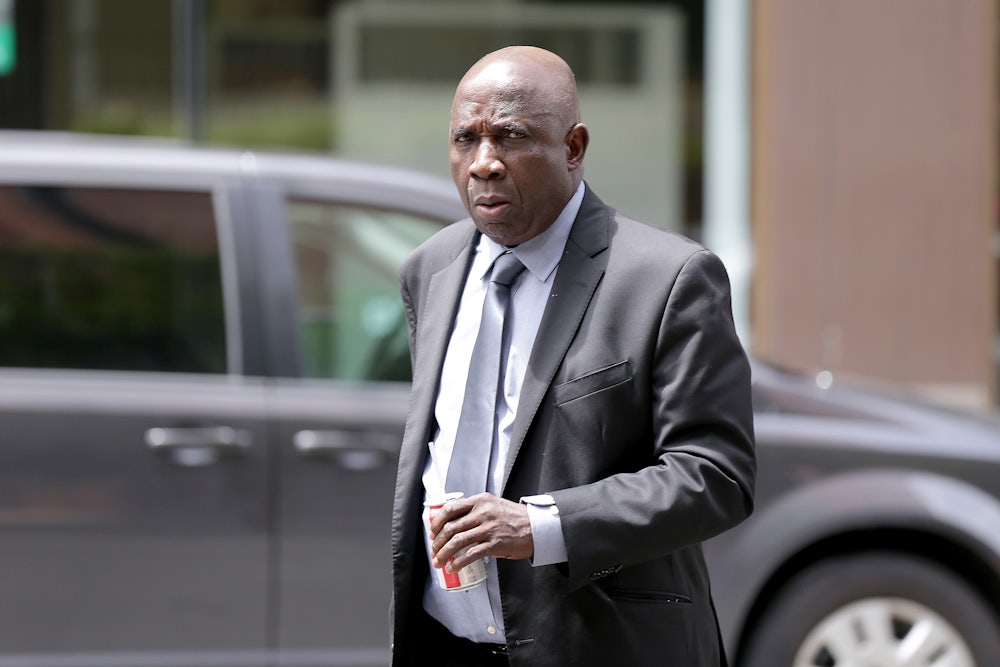Isaac was 12 when he was taken. He and his 18-year-old sister Marie had been living in the Liberian bush for about a month, having left Kakata, a town just beyond the perimeter of the U.S.-owned Firestone rubber plantation, when Charles Taylor’s forces launched an attack on the nearby city of Monrovia in October 1992.
That November day, like most Fridays, Isaac and Marie carried fruits and cassava into Konola village to sell at the market. They put the items down for people to inspect. Suddenly, a swarm of armed men and boys closed in. People began running in all directions. Marie clasped Isaac in her arms, but the rebels snatched him from her grip and tossed him into the back of a pickup truck with other able-bodied men and boys.
Marie and others ran after the vehicles. Someone told them Taylor’s defense minister, “Chief Woewiyu,” was in town. Perhaps he could release their boys.
Liberia’s back-to-back civil wars, from 1989-2003, devastated the country and killed an estimated 250,000 people. Some well-known warlords have since been promoted to the highest levels of government in Liberia; others fled to the United States, building families and businesses. One cruel side effect of this migration has been the unexpected stateside reunion of perpetrators with their erstwhile victims. Authorities estimate that as many as two-thousand human rights violators and war criminals have sought refuge in U.S. diaspora communities.
In May 2014, 73-year-old Philadelphia resident Jucontee Thomas Woewiyu—the articulate, well-dressed spokesperson, co-founder, and for several years defense minister of Charles Taylor’s infamous National Patriotic Front of Liberia—became one of the few Liberian leaders to be arrested in the United States and charged with multiple counts of immigration fraud and perjury. After a trial last June featuring testimony from Liberian victims, including Marie and Isaac, who had never before testified in a criminal proceeding about the NPFL’s crimes, he was convicted in July 2018 on eleven counts of immigration-related perjury and fraud related to lying about his violent past. His sentencing has been postponed multiple times, most recently having been scheduled for April 30. It is now expected to take place sometime in May.
Prosecutors in the U.S. and human rights groups in Liberia have celebrated the case as a victory. But the nature of the charges—immigration fraud rather than rape, murder, child-soldier conscription, or other war crimes; and nearly three decades after the offenses rather than one or two years—have also highlighted the U.S. government’s inadequate legal tools in cases like these, allowing human rights violators to live freely in the U.S. for years, even decades. Between under-resourced departments for identifying and tracking perpetrators, and the absence of robust laws permitting prosecutors to charge individuals with human rights abuses committed abroad, the United States has become, ironically, one of the more attractive locations for fleeing war criminals, who, depending on their offense, may only face prosecution on a technicality of having lied on their immigration forms—a so-called Al Capone prosecution—or deportation, rather than a prison sentence.
In recent years, efforts to introduce or amend legislation that would make it easier to prosecute or remove war criminals for their original crimes have become politically divisive, caught between a Republican Party wary of international human rights law, and a Democratic Party that’s grown increasingly receptive to calls to abolish the agency largely responsible for investigating and prosecuting such cases: Immigration and Customs Enforcement (ICE).
Woewiyu, born in Liberia in 1946, traveled from the U.S. to Liberia and neighboring countries leading up to and during the Liberian Civil War of 1989-1997. In 1997, he became a minister in President Charles Taylor’s government. All the while, he maintained a quiet life in the U.S., where, in 1972, he’d become a permanent resident, eventually settling in the Philadelphia area amid upwards of 15,000 Liberians who fled their war-torn country in the 1990s. “Frequently, it is the case that you have alleged perpetrators walking among or living within some proximity to the people of the communities whom they victimized,” said Nelson Thayer, Assistant U.S. Attorney who prosecuted the case against Woewiyu with co-counsel, Linwood C. Wright.
In the past few decades, perpetrators from conflicts in Rwanda, Ethiopia, and Vietnam have been identified in the U.S., sometimes by the very people they victimized, in everyday settings—a café, a church, or a mom-and-pop convenience store. In the early 1990s, Ethiopian immigrant Edgegayehu Taye, who worked as a waitress at an Atlanta hotel, was riding the service elevator when the doors opened to reveal a bellhop, whom she recognized as a former Ethiopian government official. The man, she claimed, had supervised her interrogation and torture in an Addis Ababa jail in the late 1970s during the country’s Red Terror—when she was bound, gagged, and hung upside-down. Taye and two other women successfully sued the man, named Kelbessa Negewo, in a civil suit.

Woewiyu’s defense team hasn’t denied his leadership in a notoriously ruthless rebel group. Instead, they argued at trial that the U.S. government knew about Woewiyu’s past: While he marked “no” on his primary immigration form (Form N-400) in response to questions about membership in an organization, participation in violent rebellion, and persecution of minorities, he did mention the NPFL elsewhere in his application process, alongside membership in church groups. And he’d previously been contacted by American officials about a separate matter while acting as spokesperson for the NPFL. “Our government knew who he was,” his attorney told the jury.
Long before Isaac was born, the U.S. and Liberia had a complex, closely intertwined relationship. In 1821, with the support of the American Colonization Society (ACS)—whose main supporter was the U.S. government—freed American slaves began migrating across the ocean to West Africa, to the area that now encompasses Liberia. Until 1847, when Liberia declared independence, the ACS ruled Liberia with an iron fist as animosity between settlers, known as Americo-Liberians, and Indigenous Liberians grew. Post-independence, Americo-Liberians ruled over a 95 percent native Liberian population for over a century, creating a system by which to subjugate the sixteen ethnolinguistic groups, whom they saw as inferior and uncivilized.
The constitution for this segregated state was drafted at Harvard, and the republic’s national flag was a near-replica of America’s. English was widely spoken, and people adopted American names. American companies began to exploit the country’s natural resources, starting with the Firestone Tire and Rubber plantation in 1926. By the mid-twentieth century, Liberia had become a strategic base through which the U.S. could fight the spread of communism in Africa: establishing military bases, training facilities, and the largest U.S. embassy on the continent. Commercial partnerships continued as well, the Firestone site becoming one of the world’s largest rubber plantations, fueling the civil war and propping up Taylor’s war efforts. A 2014 report by ProPublica and Frontline exposed the American corporation’s complicity in Taylor’s murderous rule.
Taylor’s rise came in response to an unlikely Liberian uprising nearly forty years ago. On the morning of April 12, 1980, an indigenous man named Samuel Doe, of the Krahn peoples, led a ragtag group of armed men in a coup, killing then-president William R. Tolbert Jr., a member of the Americo-Liberian elite, and announcing on national radio that a military junta, named the People’s Redemption Council, had taken power.
The U.S. recognized Doe, funneling millions of dollars to Liberia that accounted for roughly one-third of his government’s spending until 1985. That year, as Doe became more oppressive and corrupt, pocketing foreign aid and turning his birthday into a national holiday, the U.S. government funded an election it hoped would produce a civilian government. In what was widely considered to be a rigged election, Doe became president, and the U.S. government publicly supported the results.
Meanwhile, in 1969, Woewiyu traveled to America on a student visa and became a lawful permanent resident in 1972, according to court documents. In 1987, Woewiyu and Charles Taylor met and founded the NPFL in Ivory Coast, with the stated intent of getting rid of Doe. They began looking for training and arms support. Libya’s Muammar Gaddafi provided training bases for NPFL rebels and hundreds of thousands of dollars in financing; Burkina Faso facilitated weapons transfers; and Ivory Coast supported the NPFL’s incursion into Nimba County on Christmas Eve, 1989—the day that would officially spark the civil war.
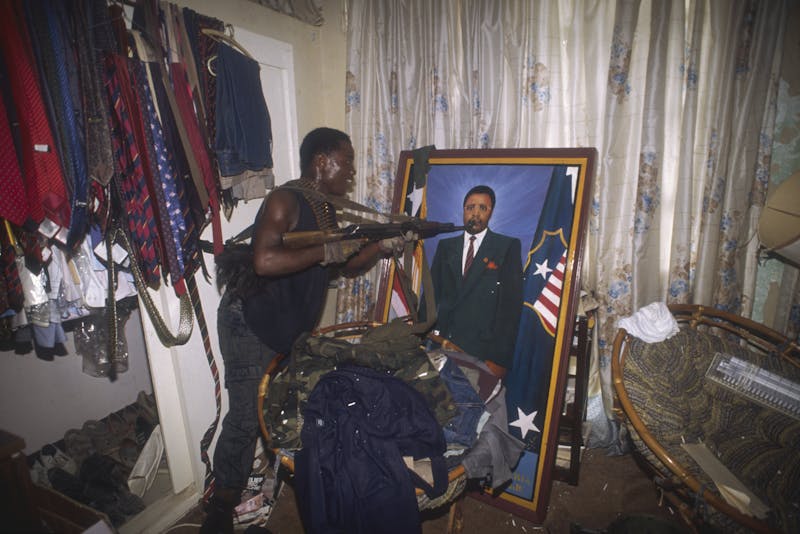
In response, Doe’s forces conducted a vicious counterinsurgency campaign, indiscriminately killing, torching villages, raping women, and looting, according to a 1994 Human Rights Watch report. Doe’s forces targeted the Mano and Gio peoples; the NPFL in turn targeted ethnic Mandingo and Khran people, whom they suspected supported Doe. The NFPL slaughtered civilians and plundered villages. With no prospect of a U.N. or U.S. intervention, in August 1990, a peacekeeping force known as the Economic Community of West African States Monitoring Group, ECOMOG, arrived with a mandate to impose a ceasefire and install an interim government. But there was no peace to be found, and ECOMOG was propelled to fight against the NPFL.
Then came the events of October 1992, which would force Isaac and Marie to flee their home and eventually lead to Isaac’s kidnapping and conscription.
In the early morning of October 15, the NPFL began its “siege of Monrovia,” ceaselessly firing rockets into the city and attacking ECOMOG positions. The offense, which later became known as Operation Octopus, sucked up vast swaths of the city, with little regard for civilian casualties. Residents I spoke to recalled losing limbs, family members, homes. One woman, who had been staying in a compound in Monrovia, told me she had been raped and shot multiple times after leaving the compound to save her daughter from indiscriminate firing, and then saw her husband killed.
At the height of the siege, five American nuns were viciously murdered in a compound in Gardnersville, on the outskirts of Monrovia; the NPFL thought them to be ECOMOG collaborators, having long considered ECOMOG a U.S.-backed proxy force. Residents who remember the incident said the nuns refused to leave as others fled the crossfire. The convent had become a refuge for civilians, and the sisters had handed out water on the main road as people flooded out. The murder, U.S. prosecutors alleged, was carried out under the orders of one of Woewiyu’s subordinates.
Operation Octopus would last much longer than expected, requiring additional recruits—including Isaac.
After Isaac was taken, Marie and others walked from the market area to Konola Base, where they were told their family members were being held. She saw Woewiyu, she told a Philadelphia jury in June. He stood about twenty feet away from her, wearing a white shirt, camouflage trousers, and a pistol tucked into an army belt. “Please, we’re begging you to let our children go,” she yelled. He didn’t respond, and the group eventually left. Marie stayed for days with a woman nearby, hoping one of the cars that crossed the main road would have Isaac in it. When she ran to check, it was never him.
At Konola Base, Isaac and the other boys were put into the Small Boys Unit, a legion of children—among the estimated 15,000 to have fought in Taylor’s forces—who became some of the most feared fighters during the war, decorating checkpoints with human heads and strings made from intestines. For three days, Isaac and the others, terrified and missing their families, learned how to kill, shoot, and dismantle an AK-47. On the fourth day, the children were told the defense minister, whom the fighters called “Chief Tom Woewiyu,” would visit.
“Children, do not worry—we are going to liberate our country; we are going to take our country back from ECOMOG,” Isaac remembered Woewiyu telling the troops. The children began to cry, and the fighters told them to be quiet: They were no better than the other children. “Keep courage. You’ll be back,” Woewiyu told them.
That night, Isaac was given drugs “to go out and kill,” and was put in a pickup truck to head to the front line. On the way there, a rocket hit the vehicle.
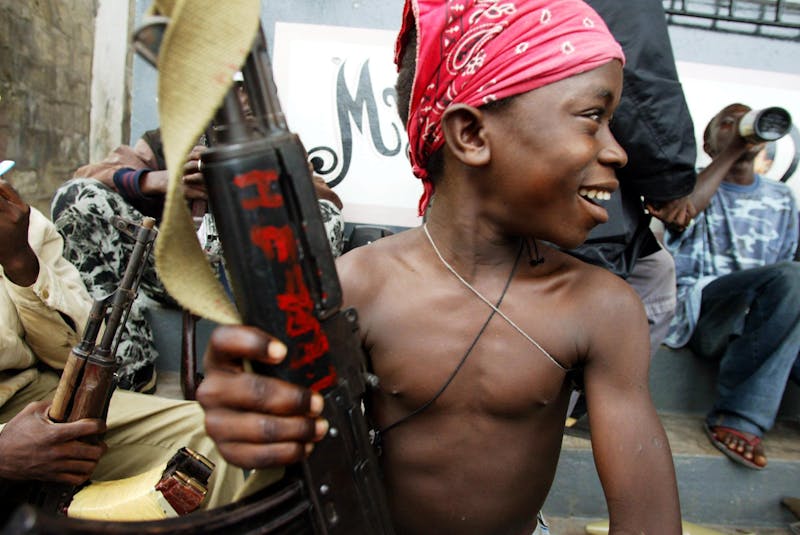
The U.S. government for decades has been hunting down war criminals who have evaded justice abroad, relying on a patchwork of scant legislation to do so. In the aftermath of World War II, thousands of Nazi war criminals took up residence in the U.S., often with the assistance of American intelligence officials who created a “safe haven” for Nazis and their collaborators. In the late 1970s, the Justice Department created the Office of Special Investigations (OSI) to investigate and prosecute these Nazi offenders. In 2010, OSI was folded into a new Human Rights and Special Prosecutions Section, investigating and prosecuting human rights violators to varying degrees of success. It has been sharply criticized by human rights advocates who, The Washington Post reported in 2018, consider the unit risk-averse, and say it “routinely rejects cases.”
Tracking and apprehending foreign offenders has also traditionally been a responsibility of the Immigration and Naturalization Service and, since 2003, of ICE. The current unit within ICE dedicated to the task—the Human Rights Violators and War Crimes Center (HRVWCC)—is pursuing more than 1,750 leads and removal cases and 135 active criminal investigations involving foreign offenders. With a staff of roughly 50, and a budget of around $5.3 million, they’re less than 1 percent the size of the nearly twelve thousand strong, $4.9 billion Enforcement and Removal Operations branch, which has become a ubiquitous, terrifying presence for immigrant communities under President Trump.
Relying on work by the HRVWCC’s predecessors within ICE—the Human Rights Violators Unit and the Human Rights Law Section—as well as the FBI, the Justice Department indicted Charles “Chuckie” Taylor Jr., the U.S.-born son of Charles Taylor, in 2006, for the crime of torture. The indictment was the first of its kind under the 1994 Torture Statute, which made it a crime for a U.S. citizen or anyone present in the U.S. to commit torture abroad, regardless of the victim’s nationality. In 2009, a jury sentenced Taylor, who had headed a paramilitary unit colloquially known as the “Demon Forces” during his father’s presidency, to 97 years in prison.
That case has since been the exception, not the rule. Investigating crimes that occurred on foreign soil, sometimes decades ago, is time and resource-intensive. “A tiny phonetic mistake in a foreign dialect can imperil a case,” journalist Eric Lichtblau observed last year, in a New Yorker profile of Mike MacQueen, an investigator with the War Crimes Program who has been hunting war criminals for the Justice Department and ICE for three decades. But more importantly, the legal framework to prosecute such criminals is deficient or useless.
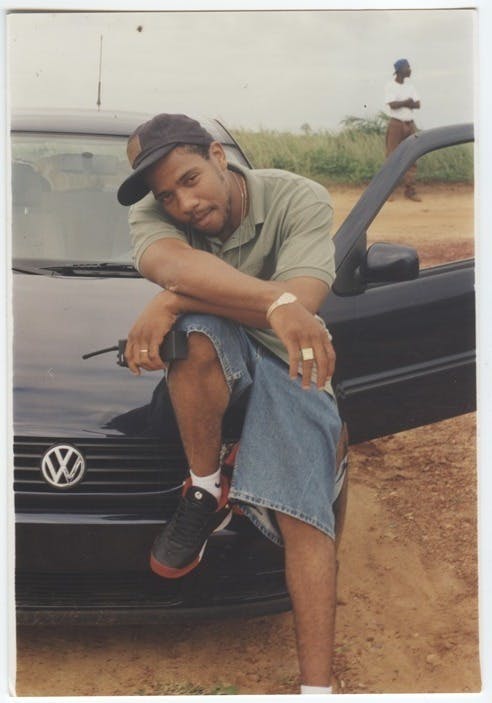
The principal of “universal jurisdiction” is one of the foundational concepts of international law, developed largely in response to the Second World War. The idea is that a serious crime committed in one country or jurisdiction can be prosecuted under the provisional authority of a different country or international body, as the victorious powers in World War II did with former Third Reich leaders at Nuremberg. The exercise of this principle, however, depends in large part on the prosecuting country’s laws and political will. The U.S. has lagged behind its foreign—particularly European—counterparts in prosecuting universal jurisdiction cases. In 2018 alone, specialized units across the world investigated, prosecuted, or brought to justice 149 suspects of genocide, war crimes, and crimes against humanity, and of those eight were convicted. The last and only case in which an individual was prosecuted and convicted for a substantive human rights crime in the U.S., by contrast, was the Chuckie Taylor case, a decade ago.
The question of whether the International Criminal Court (ICC), a body established in 2002, could exercise jurisdiction over offenders in the U.S. is equally complex. The U.S. is not a party to the Rome Statute, the founding treaty of the ICC. In 2005, under George W. Bush, the U.S. abstained from a vote in which the United Nations Security Council referred genocide and war crimes allegations in Darfur to the Court, but did not cast an opposing vote, since the resolution exempted U.S. nationals who supported operations in Sudan. In 2015, Dominic Ongwen, a senior commander in Uganda’s Lords Resistance Army, wanted by the ICC for Crimes Against Humanity, surrendered to the U.S. military in the Central African Republic; the Obama administration transferred him to the Court.
“The Obama administration not infrequently would take actions that were friendly or supportive or collegial [to the ICC],” Dixon Osburn, the executive director of the San Francisco-based Center for Justice and Accountability, told me. But U.S. cooperation is like “political football,” he said. Republican administrations have traditionally avoided any circumstance in which non-U.S. courts could prosecute Americans. In November 2017, the ICC prosecutor requested authorization to open an investigation for possible war crimes and crimes against humanity in Afghanistan, which could include crimes committed by U.S. military personnel and CIA officers. “We will not cooperate with the ICC,” Trump’s national security adviser John Bolton said last fall, regarding the case. “The ICC is already dead to us.”
But meanwhile, the issue caught the attention of one or two legislators.
As universal jurisdiction cases were successfully being prosecuted abroad, by the mid-2000s, Illinois Democratic Senator Richard Durbin was sitting on the Subcommittee on Human Rights and the Law. The U.S., he knew, did not have laws allowing it to prosecute certain human rights violations by non-U.S. nationals abroad. “The result is that those guilty and convicted of a variety of international crimes could come to the U.S. for safe haven,” Durbin told me. “I found that reprehensible.”
In a November 2007 subcommittee hearing Durbin chaired, a Salvadoran man named Dr. Juan Romagoza testified that his Salvadoran torturers, who’d been found liable for torture and human rights abuses in a 2002 civil suit, had retired to comfortable lives in South Florida. “We just had no basis or criminal charge we could use effectively at that time,” Mona Ragheb, a senior legal adviser with the Human Rights Law section in the Department of Homeland Security, told me—the Immigration and Nationality Act was not amended to allow for deportations in these cases until 2004, and the political will to proceed with the cases did not materialize until 2009. (The generals in question, Carlos Eugenio Vides Casanova and Jose Guillermo García, were finally deported in 2015 and 2016, respectively.) ICE agents in the 2000s also discovered that a man named Marko Boškić was living in the U.S. as a refugee. Boškić admitted to U.S. authorities that he had shot civilians during the 1995 Srebrenica massacre. He was charged with visa fraud, since laws allowing prosecutors to charge him with genocide or crimes against humanity did not exist.
This “Al Capone method”—so called for the Prohibition-era gangster who was convicted on tax evasion rather than murder or racketeering—is a favorite prosecutorial tactic in human rights cases where the statute of limitation has expired, the crime occurred before the relevant law was enacted, or the U.S. government simply doesn’t have jurisdiction to prosecute a foreign crime. Since the immigration process asks about crimes committed abroad, war criminals can be prosecuted for immigration-related fraud, as in Woewiyu’s case.
Durbin has since found unexpected partners—including former Oklahoma Republican Senator Tom Coburn—to pass bipartisan legislation helping to close legal loopholes in such cases. Those bills have extended the roster of crimes of universal jurisdiction to include genocide and the recruitment and use of child soldiers, so that U.S. courts could prosecute a foreign perpetrator in the U.S. (These laws only apply to crimes that occurred after the bills passed—perpetrators like Woewiyu, for example, could not be charged under them.) Other influential lawmakers, including the late Senator John McCain and Senator Dianne Feinstein, passed legislation that strengthened torture bans.
But attempts to introduce a broader crimes against humanity law have failed, and there’s still, according to Osburn of the Center for Justice and Accountability, “a big gaping hole,” in U.S. legislation: Liberian rebel leader George Boley, for example, prosecuted under the child soldier law in February 2012, was not sentenced to jail time but rather was deported back to Liberia, where he now serves as a member of the country’s House of Representatives. America “is an attractive place to avoid prosecution; our laws are such that they can escape punishment at home and try to fly under the radar screen here,” Osburn said.
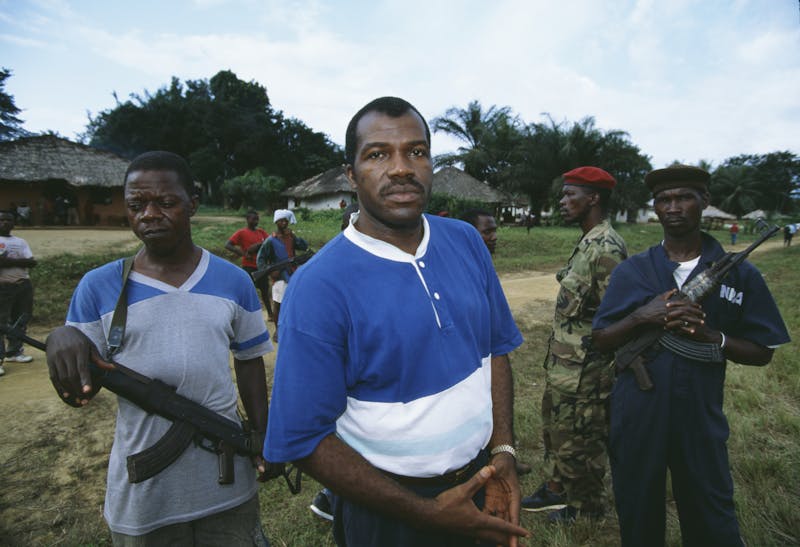
Even ICE’s otherwise expansive power to deport foreign offenders, when no options for prosecution exist, may be limited in such cases. The Immigration and Nationality Act of 1965 prohibits a person involved in persecution from obtaining asylum or refugee status, but it does not prevent such an individual, if they fail to disclose their past, from entering the U.S. and getting immigration benefits, eventually adjusting their status through marriage or a job, for instance. Efforts to amend those gaps have become bogged down in broader immigration debates. With the Trump administration focusing much of its attention on migration from Latin America, and Democrats reticent to broaden ICE’s powers, legislative efforts introduced to address human rights violators in the U.S. as part of comprehensive immigration reform have stalled. “We could certainly benefit from amendments in legislation,” Ragheb said. “But there has to be a will.”
Perhaps unsurprisingly, in the absence of government action, civil society groups have stepped in to fill the void.
On a sweltering afternoon in Monrovia this past summer, as the Woewiyu trial was still happening in Philadelphia, around sixty men gathered in an outdoor tea shop, taking time from the World Cup series to discuss whether Liberia should install a war crimes tribunal. As a man named Hassan Bility walked in, wearing traditional Islamic dress, the room quieted, and all heads turned toward him.
Franklin K. Wesseh, who had known Bility since the days when both sought refuge in Ghana during the war, introduced Bility—“a young man who suffered persecution, was tortured, and survived,” he said. Since then, “he has always stood tall to ensure that justice is served—not only in Liberia but globally.”
A man passed around cups of tea, supposedly with special properties; it was strong and heavily sweetened. Bility took a sip and stood at the podium. “No government has been ready to hold people accountable for crimes inside Liberia,” he began. “We were the first.”
Bility’s team, the Global Justice and Research Project, has become part of a worldwide movement of civil society groups that have begun to seek justice and reparations for victims of atrocities post-World War II, where a local jurisdiction may not have the will or authority to do so. (Nearly a decade has passed—without government action—since Liberia’s Truth Commission called for the country to set up a special war crimes tribunal.)
The quest for justice is personal for Bility. One June afternoon in 2002, Bility and his three-year-old son went for ice cream. Five men dressed in civilian clothing approached them on the sidewalk. They kicked and shoved Bility into a two-door, red vehicle. Bility looked out the rearview mirror to see his son crying, abandoned on the side of the road. Charles Taylor accused Bility, who was a well-respected journalist reporting on Liberia’s proxy war in Sierra Leone, of plotting to overthrow the government. He called him an “unlawful combatant,” a term inspired by president George Bush, coined after 9/11 to detain people without charge or trial, outside of the laws of war.
For the first few weeks, Bility was kept incommunicado in Taylor’s residence in Congo Town, Monrovia, where the president personally interrogated him. Early press reports said he was feared dead. After about a month, he was moved to an underground three-foot cell full of water. Maggots crawled on his body. Interrogators would blindfold him before electrocuting his genitals, and used twine to bind his arms behind his back, dislocating his shoulder. All told, he was moved to 13 different prisons. In December 2002, nearly seven months after his abduction, Bility was released to the U.S. government on the condition that he would leave Liberia immediately.
Bility entered the U.S. at a time when perpetrators of the Liberian wars also sought haven, lying on asylum applications. He spent the following decade living in Boston, and, during that time, was asked to testify in several cases involving suspected Liberian perpetrators living in the U.S. The experience, and general culture of impunity for Liberian perpetrators, inspired him to return to Liberia in 2012 and found GJRP. Since then, the organization has grown to over a dozen employees whose investigators travel across the country to document war-time atrocities: They have investigated roughly one hundred cases of possible war criminals and have helped multiple jurisdictions, including in Belgium, Switzerland, France and the U.K., bring cases against Liberians living abroad, regardless of their ethnicity or warring faction. Bility regularly receives death threats from groups inside Liberia and the U.S.—particularly when he is investigating individuals from his own tribe, the Mandingos. “Hassan’s protection is his publicity,” said lawyer Alain Werner, the director of Civitas Maxima, a Swiss-based organization that works in partnership with Bility’s group. “Everybody in Liberia knows that he collaborates with many war crimes units throughout the world.”
In January 2014, U.S. authorities indicted Woewiyu for perjury and fraud related to his immigration papers. He was accused of having lied on his 2006 citizenship application by not disclosing his role in the NPFL and his connection to the group’s crimes. Woewiyu was arrested at Newark Airport, when he was returning from a trip to Liberia, that May. The case involved intensive resources and several trips to Liberia, during which U.S. prosecutors reconstructed crime scenes and identified victims who could travel to the U.S. to testify. “We frankly wouldn’t have been able to make these cases without their assistance,” Thayer said of Bility and his team.
“I honestly believe at some point we will have a war crimes court,” Bility told the men at the gathering this past summer. In the meantime, the team keeps the case files locked up for safekeeping and in encrypted, digital format. When he finished talking, the crowd clapped.
Marie was one of over a dozen witnesses from Liberia called by U.S. prosecutors in June 2018 to the witness stand to testify about the NPFL’s and Woewiyu’s wartime activities. Many who had never been on a plane, let alone an escalator, flew to Philadelphia to recount for the first time in an official capacity the horrors they’d experienced nearly thirty years earlier, from mass executions and fighting as a child soldier to sexual violence.
Marie wore a colorful dress and long, braided hair tied behind her head. After days of not finding Isaac, she told the jury, she learned a car full of soldiers had been ambushed. The wounded had been taken to a nearby hospital. It was miles away, so she borrowed 500 Liberian dollars for a bus ticket to the hospital. When she arrived, she dashed to the gate. “I beg, will you help me,” Marie asked the guard. “I’m looking for my brother.” She raced from room to room, calling Isaac’s name.
Eventually, Marie heard Isaac call back. “I’m here,” he said. “I’m dying.” He lay with a bandage wrapped around his head to cover his eyes, and his right hand was amputated; debris from the rocket attack had also hit his shoulders and side.
Woewiyu’s defense team declined to comment for this piece, and efforts to reach Woewiyu through his attorneys have been unsuccessful. At trial, Woewiyu’s attorney Catherine Henry argued that testimonies like Marie’s were a distraction in the case, which was merely about immigration. She said the prosecutors were using the case as a “back-door war crimes tribunal”: “The United States doesn’t have the jurisdiction to prosecute war crimes that happened in Africa,” she said. “There’s nothing they can do in this courtroom to change that.” The prosecution, by contrast, held that the victims’ testimony proved Woewiyu’s participation in violent rebellion and persecution—contrary to his statement on the N-400.
After a three-week trial, the jury found Woewiyu guilty of immigration fraud and perjury charges on July 3. Sentencing is expected to take place in May. Woewiyu could face up to 110 years in prison and a fine of $4 million; he may also face deportation proceedings, though it’s possible he will never be compelled to answer for his wartime activities. Linwood C. Wright, one of the prosecutors in the case, still thinks prosecution, under whatever laws are available, is the right choice. “I think that’s something most Americans want,” he said, “and it’s certainly something immigrant communities who have come here in search of a better life deserve; nobody should have to live next door to somebody who has committed human rights violations.”
The witnesses flew back to Liberia where, since graduating university, Marie has become a businesswoman, running “mini shops.” Isaac lives with her. His eyes have not recovered, and he suffers from chronic pain. “The tears run down all day and night,” Marie said.
If one day Woewiyu is deported, they could be countrymen again.
Isaac and Marie’s names have been changed for security reasons.
This piece has been updated to reflect the correct names for the Human Rights Violators and War Crimes Center and the Human Rights Violators Unit, the correct terminology for permanent resident status, and the participation of the FBI in the case against Chuckie Taylor.
